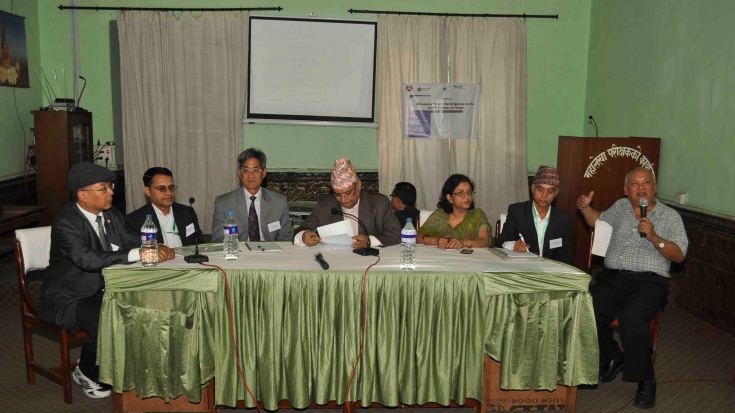The essence of a one and half-day workshop was nicely captured in the closing remarks of Nepal’s Auditor General, Mr. Bhanu Prasad Acharya that took place at the Office of the Auditor General (OAG) in Kathmandu from 6th -7th October 2013.
“I found the workshop extremely useful as I feel the participation and perspective of the civil society organizations (CSOs) will assist us to improve the current system of auditing in Nepal,” said Mr. Acharya.
The workshop on “Advancing Public Participation in the Audit Process in Nepal” has given a paradigm shift towards the approach to the auditing process in Nepal - for the first time in the history of Nepal, it brought forward an agenda that promises to maximize the efficiency and impact of OAG through engagement with other stakeholders.
Organized by the Office of the Auditor General (OAG) Nepal in collaboration with the World Bank Nepal Country Office, the Program for Accountability in Nepal (PRAN), and The World Bank Institute (WBI), the workshop’s major objective was to facilitate the engagement between OAG (supply side) and civil societies (demand side) towards exploring challenges and opportunities for implementing various participatory audit mechanisms in Nepal.
In the opening address, the Auditor General laid out the vision and strategy of the OAG and expressed the need to break the “silo” barrier and work with the CSOs to improve the impact of audit in Public Financial Management (PFM).
Mr. Bigyan Pradhan, Sr. Operations Officer, of the World Bank stressed the need for improved accountability and transparency which can happen by linking the supply and demand side of PFM; he said that “CSOs can play a critical role in building pressure on the system to improve PFM based on the audit recommendations thereby resulting in good impact; the quality of performance audit, on the other hand, can also be enhanced with effective engagement of CSOs with OAG in performance audit process tying the knowledge and experience of CSOs at the grassroot level.”
The importance of civil engagement in the audit process
“During the course of our interaction, we found out that we could work with the CSOs to make the Public Financial Management (PFM) in Nepal more transparent and accountable. The CSOs can give their inputs in the Planning, Execution and Reporting phase. We have been working informally with the CSOs already but this workshop has given us a more concrete structure to address the issues of accountability,” said Mr Ganesh Prasad Pokharel, one of the participants representing OAG.
Dr. Chandra Mani Adhikari, a CSO representative said that as the development budget is substantially increasing there is a need for even closer scrutiny on public expenditure and with the comparative advantage of CSOs working at the grassroots and knowing the ground reality, can add value to improving the audit impact and also the quality of performance audit.
The highly engaging workshop brought together more than 60 participants from civil society organizations, the media, the staff from OAG, the World Bank, and international experts from India and South Africa. Dr. Prithvi Raj Ligal, PFM expert and former National Planning Commission Vice Chairman, presented the current auditing scenario in Nepal:
- Growing irregularity in PFM and increasing volume of arrears in the audit report;
- Limited coverage – Sizable part of public expenditure still missing from OAG audit domain – OAG is not mandated to audit expenditures of Village Development Committees (VDCs), Municipalities, and schools;
- Auditing process being looked more as a technical subject and demystifying the process not attempted;
- Local expenditure agencies such as, District Development Committees (DDCs), VDCs and Municipalities more skeptical in sharing information and in involving CSOs in the audit process. Audit reports of DDCs, VDCs and Municipalities are never discussed at the local level – with CSO and common people.
“To make people aware of the good and bad results of the audit report so that they can create a platform to improve transparency and accountability in the government; to put pressure on the executing agency to take action against those responsible for mismanagement in the government resources thereby increasing value of money, CSOs have a vital role in the auditing process,” said Dr. Ligal.
During the workshop, experiences from South Africa and India were also shared by Jay Kruuse, Director of Public Service Accountability Monitor (PSAM), Rhodes University and Amitabh Mukhopadhyaya, Cowater International, supporting OAG/Nepal.

